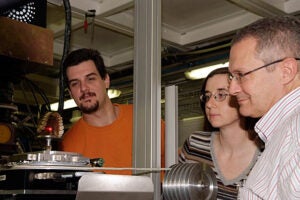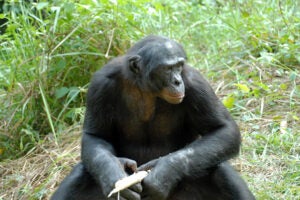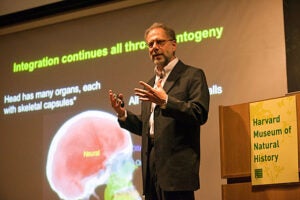Tag: Human evolutionary biology
-
Nation & World
Evolution hurts sometimes
The same skeletal changes that allowed humans to walk upright make us vulnerable to knee osteoarthritis as we age, human evolutionary biologist says.
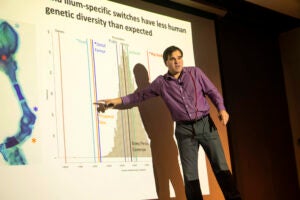
-
Nation & World
What’s the dog doing now?
Students in the class examine a range of dog behaviors, how they evolved, and how they relate to human behavior.

-
Nation & World
Does your dog care if you die?
Any owner would say yes. Here’s what the science says.

-
Nation & World
A flawed masterpiece
In a new paper published in Cell, Harvard researchers exploring the genetic features that help make the knee possible found that the regulatory switches involved in its development also play a role in a partially heritable disease.
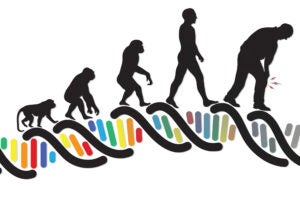
-
Nation & World
New faculty: Martin Surbeck
A new member of the faculty of the Department of Human and Evolutionary Biology, Martin Surbeck runs one of the few bonobo research sites in the world.

-
Nation & World
Music everywhere
Scientists at Harvard published a study on music as a cultural product, which examines what features of song tend to be shared across societies.

-
Nation & World
Targeting incest and promoting individualism
Harvard Professor Joseph Henrich and a team of collaborators researched how a Roman Catholic Church ban in the Middle Ages loosened extended family ties and changed values and psychology of individuals in the West.
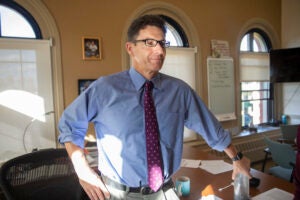
-
Nation & World
You are what you eat — and how you cook it
Scientists have recently discovered that different diets — say, high-fat versus low-fat, or plant-based versus animal-based — can rapidly and reproducibly alter the composition and activity of the gut microbiome, where differences in the composition and activity can affect everything from metabolism to immunity to behavior.

-
Nation & World
Hunters, herders, companions: Breeding dogs has reordered their brains
Erin Hecht, who joined the faculty in January, has published her first paper on our canine comrades in the Journal of Neuroscience, finding that different breeds have different brain organizations owing to human cultivation of specific traits.
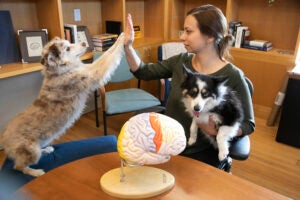
-
Nation & World
Leave those calluses alone
A running-studies pioneer takes a look at walking, with and without shoes, and gives calluses a thumbs-up.
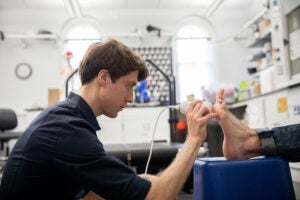
-
Nation & World
Following conflict, a turn to the divine
Working with a team of international researchers, Harvard scientists gathered survey data in several locations around the globe and found that, following the trauma of seeing a friend or loved one killed or injured during conflict, many became more religious.

-
Nation & World
March mammal madness
An assistant professor of evolutionary biology, Katie Hinde is also the creator of Mammal March Madness, a tournament that emulates the college basketball playoffs and pits species against each other in simulated combat.
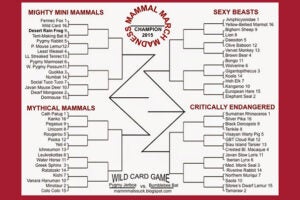
-
Nation & World
Status shift for whale pelvic bones
New research challenges the notion that the small pelvic bones found in whales are evolutionary vestiges.

-
Nation & World
Study ties fetal sex to milk production
A new study offers the first evidence that fetal sex can affect the amount of milk cows produce, a finding that could have major economic implications for dairy farmers.
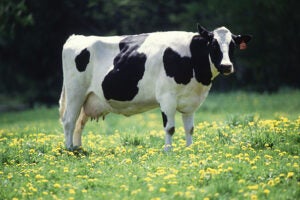
-
Nation & World
Right down the middle, explained
The ability to throw an object with great speed and accuracy is a uniquely human adaptation, one that Harvard researchers say played a key role in our evolution.
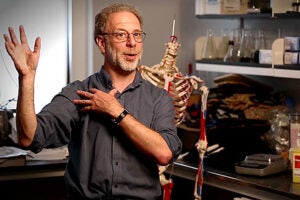
-
Nation & World
Obesity? Diabetes? We’ve been set up
The twin epidemics of obesity and its cousin, diabetes, have been the target of numerous studies at Harvard and its affiliated hospitals and institutions. Harvard researchers have produced a dizzying array of findings on the often related problems.
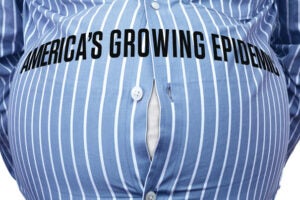
-
Nation & World
Why cooking counts
In a first-of-its-kind study, Harvard researchers have shown that cooked meat provides more energy than raw meat, a finding that challenges the current food labeling system and suggests humans are evolutionarily adapted to take advantage of the benefits of cooking.

-
Nation & World
The efficient caveman cook
Harvard researchers say the rise of cooking likely occurred more than 1.9 million years ago and bestowed on human ancestors a gift of time in the form of hours each day not spent eating.
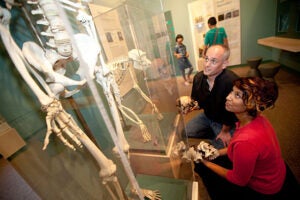
-
Nation & World
Just rewards
A Harvard University study built around an innovative economic game indicates that, at least for our younger selves, the desire for equity often trumps the urge to maximize rewards.
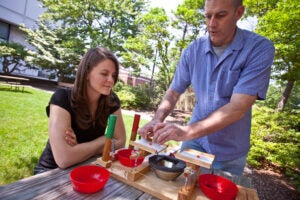
-
Nation & World
Harvard’s lasting effect
Harvard senior Marcel Moran recalls the classes he loved. But, more important, he realizes how his education has helped him to analyze and synthesize what he learned while at Harvard.

-
Nation & World
Teeth marks
A sophisticated examination of teeth from 11 Neanderthal and early human fossils suggests that modern humans’ slow development and long childhood are recent and unique to our own species, and may have given early humans an evolutionary advantage over Neanderthals.
